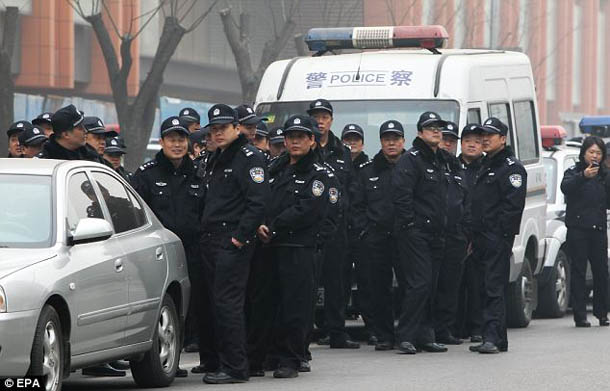 Dharamshala: China is in the midst of a frustrated censorship race as security and police forces muscle in and regime frontmen scurry to come up with new regulations to counter the foreign press.
Dharamshala: China is in the midst of a frustrated censorship race as security and police forces muscle in and regime frontmen scurry to come up with new regulations to counter the foreign press.
Tibet is one place where restrictions on foreign media were recently put into overdrive, and the region is now virtually closed to foreign visitors. In justifying the tighter controls, authorities in China have cited 'safety concerns' such as overcrowding and cold weather, despite the fact that Tibet is a 'minority' region of China with a low population compared to major cities such as Shanghai and Beijing, which experience a constant crush due to overpopulation, and the fact that Beijing is an average of 10°C cooler than Lhasa, or up to 20°C with the wind-chill.
Foreign media have been informed that they will now have to seek special advance permission to film or operate in public areas or risk having their visa revoked, in an apparently nervous attempt by the government to roll back press freedoms awarded in the lead-up to the 2008 Beijing Olympics. At the time, Beijing faced strong opposition in its bid for the games due to concerns over human rights abuses and lack of media freedom, only managing to secure support by making shallow promises of reform which it clearly never intended to keep.
In the past two weeks, attempts by anonymous organisers to stage nationwide protests have not yielded the anticipated results, as the government's well-oiled censorship machine has launched a vicious offensive against the free-flow of information within its borders, blocking 'sensitive' websites and deleting 'politically inappropriate content' almost instantly. Foreign news from the BBC and other sources is frequently blacked out and 'technical disruptions' help filter content for television and radio audiences.
The call to protest has been renewed and Chinese citizens are being urged to gather in 41 cities across the country on Sunday to demand their rights and greater freedoms, as the government announces an ever more invasive strategy which includes tracking all residents through their mobile phones and increasing surveillance of the population.
The credibility of the threat the protesters pose however is hindered by the isolation of individuals and prevention of communication to bring people together. The recent calls for demonstration, which urged people to 'stroll by' protest sites, were quashed by an unprecedented show of force in the major cities of Shanghai and Beijing, with several bystanders arrested for unknown reasons and news crews from the BBC and CNN detained at local police stations for attempting to photograph the stifling security presence. One reporter suffered a broken rib, and another sustained a hand injury after receiving kicks and punches to the head and body.
Calls on the internet for the public 'Jasmine Revolution' have sparked a violent crackdown by government forces, fearful of a Middle-east inspired uprising that would topple their one-party dictatorship in the name of democracy. The communist regime's information war on its own people, who remain virtually blindfolded and in a dark oblivion to the outside world, is now showing signs of falling apart as the spread of news through the internet threatens the credibility of government propaganda.
According to the 2008 regulations governing foreign media – which formalised the temporary freedoms granted to foreign reporters during the Beijing Olympics – foreign correspondents are allowed to interview any consenting individual without official permission. The regulations do not apply in Tibet, where Chinese authorities continue to ban independent reporting.
The new restrictions put places like Beijing's People's Square and Wangfujing street on par with Tibet as out-of-bounds areas where foreign reporters need special permission to work, and come after journalists were attacked and harassed in the same areas over the weekend.
Propaganda in China is led by the government agency 'Xinhua', which sets the pace for all other news outlets and journalists to follow. Those who do not are quickly silenced and face termination and even imprisonment.


![Tibet has a rich history as a sovereign nation until the 1950s when it was invaded by China. [Photo: File]](/images/stories/Pics-2024/March/Tibet-Nation-1940s.jpg#joomlaImage://local-images/stories/Pics-2024/March/Tibet-Nation-1940s.jpg?width=1489&height=878)















